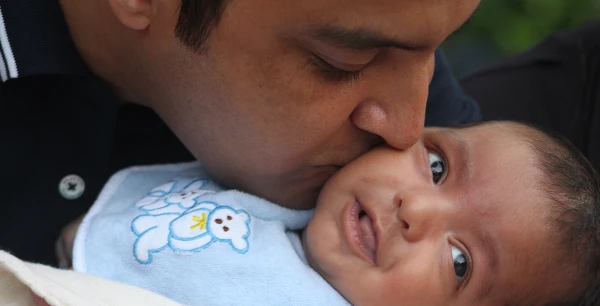 Everyone knows that sleep is important (especially baby sleep). Adults need an average of seven to eight hours of sleep each night, minimum, in order to function normally. That means that when you get adequate sleep, you will be able think clearly, focus, and your mood will be elevated. Recently, there has been some new research studies that say some people are fully rested after only six hours (what they are calling the ‘core hours’). I am definitely NOT one of those people. I think what is really important is to focus on how you feel when you wake. Do you feel rested? Do you often wake without an alarm clock?
Everyone knows that sleep is important (especially baby sleep). Adults need an average of seven to eight hours of sleep each night, minimum, in order to function normally. That means that when you get adequate sleep, you will be able think clearly, focus, and your mood will be elevated. Recently, there has been some new research studies that say some people are fully rested after only six hours (what they are calling the ‘core hours’). I am definitely NOT one of those people. I think what is really important is to focus on how you feel when you wake. Do you feel rested? Do you often wake without an alarm clock?
The Importance of Sleep For the Whole Family
Sadly, most adults get an average of only 6 hours of sleep each night. There are so many reasons that adults (and babies) need to get a full, restful night’s sleep. Here are six reasons that achieving those 8 hours are so important from Harvard Women’s Health:
1. Learning and memory: Sleep helps the brain commit new information to memory through a process called memory consolidation. In studies, people who’d slept after learning a task did better on tests later.
The same rule is true of baby sleep, our children are learning at an incredible rate.
2. Metabolism and weight: Chronic sleep deprivation may cause weight gain by affecting the way our bodies process and store carbohydrates, and by altering levels of hormones that affect our appetite.
3. Safety: Sleep debt contributes to a greater tendency to fall asleep during the daytime. These lapses may cause falls and mistakes such as medical errors, air traffic mishaps, and road accidents.
Have you ever noticed that children are more accident prone when they’re tired? While children aren’t going to cause traffic accidents, they are more likely to be clumsy and more prone to getting hurt when they are sleep deprived.
4. Mood: Sleep loss may result in irritability, impatience, inability to concentrate, and moodiness. Too little sleep can also leave you too tired to do the things you like to do.
The same goes for kids. Children are less flexible and adaptable, which can cause an increase in temper tantrums and even reduce their appetite. Imagine being too tired to eat!
5. Cardiovascular health: Serious sleep disorders have been linked to hypertension, increased stress hormone levels, and irregular heartbeat.
Children’s heart health may also be put at risk. Quality sleep is so important!
6. Disease: Sleep deprivation alters immune function, including the activity of the body’s killer cells. Keeping up with sleep may also help fight cancer.
This is so important for our children. We want to help build their immune systems, and they need an adequate amount of sleep to do that.
Just one of the items from that list is enough to make me think twice about not getting the recommended amount of sleep! In addition to all of the items on that list, getting enough sleep allows you to be your best for your babies, and will help you to teach them how to get good quality, restful sleep. And don’t forget that sleep is good for your entire family’s relationship!
Because babies and toddlers grow at such a fast rate (just look at that growth chart on your wall), they need a significantly larger quantity of sleep than adults. Depending upon their age, babies and toddlers need between 12 and 15 hours of sleep every single day.
Sleep is restorative, and helps everyone in your family be at their best, but did you know that the length of time your baby sleeps is just as important as the quality of sleep they get? With children, consistency is key. Babies thrive on scheduled sleep, which means between one and two naps during the day and a long period of uninterrupted, high quality sleep at night. This is important because for both babies and children, sleep is when they do their most important job: growing.
Helping babies sleep can be challenging in that they aren’t quite old enough to recognize when they are ready for sleep. Watch your baby or toddler for cues that they are tired, such as eye, rubbing, acting drowsy or sluggish, and follow their lead. If you have a child who does not show sleepy signs (not all children do), you will have to watch the clock, too. If you pay attention, you should be able to figure out when your baby is ready for naptimes, as well as bedtime. As some children get older, they will begin to tell you when they need sleep, but not all children are willing to admit this, so be mindful, and help them learn.
In order to further encourage sleep, it’s smart to create a sleep inducing bedtime routine that can be abbreviated for use before naptime as well. Remember, children thrive on consistency, so try to flesh out a flexible daily schedule that includes meal times and naptimes that are consistent each day.
This consistency will help both you and your baby have a restful night’s sleep, because a well-rested, happy family is the goal.
A few additional tips to help you encourage the entire family to sleep:
Create a flexible schedule that works
Your schedule does not need to be extremely rigid, but try to focus on having meals and sleep happen at the same time each day.
Do not skip naps
For children under three years old, skipping naps can actually make it more difficult for your child to get good quality nighttime sleep.
Stick to your bedtime routine
Find a bedtime routine that works for you and your child, and stick to it. Once you’ve figured out what works, you can modify that routine to help your baby wind down before naptime.
Prepare for bed BEFORE bedtime
Start giving your child some ‘wind down’ time about thirty minutes before you begin your bedtime routine.
Limit screen time
Did you know that television, tablets, and even smart phones actually have restorative properties, which can cause a false sense of rest. This goes for adults, too!
Sleep is so important for the whole family, so please make it a priority.
Was this article helpful to you? Please tell us by commenting below! For more baby, toddler, and family sleep tips and tricks, please subscribe to The Sleep Lady’s Facebook, Twitter, Pinterest, Google+, and YouTube channel! If you are looking for more sleep content, please check out Get Sleep Now-an exclusive members-only area designed to provide in-depth help and support during your sleep coaching experience.


